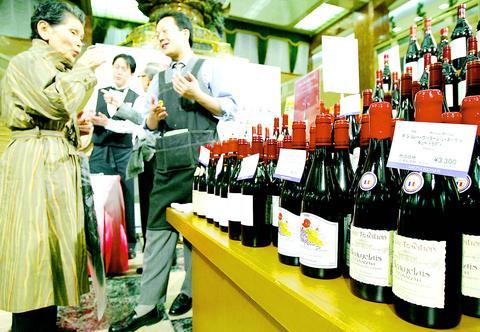As the first glasses of Beaujolais Nouveau were poured after midnight struck yesterday, producers of the youthful French wine had every reason to toast Japan, which has overtaken Germany as the world's biggest importer of the purple plonk.
"This year, for the first time, Japan has become the largest importer of Beaujolais Nouveau, ahead of Germany," said top Beaujolais merchant Georges Duboeuf at a midnight reception in Tokyo to promote his wine to 200 invited guests.
It is a worthwhile effort, as Duboeuf's wines account for 30 percent of the highly lucrative Japanese Beaujolais Nouveau market.

PHOTO: AFP
"Total imports of Beaujolais Nouveau to Japan this year are a record 600,000 cases, or 7.2 million bottles, as each case holds 12 bottles," Tamon Koshino, a spokesman for Japanese drinks giant Suntory told reporters at an earlier event.
That represents a 3.5 percent increase from last year, when Japan imported 580,000 cases, he said.
An exact figure for German imports was not immediately available.
A spokesman for Japan Airlines said it needed about 60 special charter flights to bring all the wine in ready for yesterday's release, most of them arriving over last weekend.
"I love Beaujolais Nouveau. I first discovered it 10 years ago, and I've drunk it every year since," said one of Duboeuf's guests, Yoshuko Tetsuya.
"I used to drink quite a lot of sake, but now I prefer wine, especially red. It goes well with Japanese food and more shops are selling it," said the 30-year-old.
Even though consumption of Beaujolais Nouveau -- and wine in general -- is growing in Japan, it still lags far behind sake, often described as a rice wine, but technically a brewed alcoholic beverage.
"In 2001, the annual consumption of sake was estimated at about 8.4 liters a person, while for wine, both imported and domestic, it was only 2.7 liters a head," a spokeswoman for the French trade commission in Tokyo told reporters.
Beaujolais Nouveau is in such demand that it appears to have defied the deflationary trend which has plagued Japan's economy for more than four years, although the strength of the euro has also contributed to higher prices than last year.
Koshino of Suntory, which exclusively imports 215,000 cases of Duboeuf's wines, said the retail price of a bottle was in the range of ¥2,000 to ¥2,300 (US$18.35 dollars to US$21.10).
"We've already received a lot of orders and we could run out ... about 50 percent of our bottles will be sold between now and Sunday," he said.
Despite the huge marketing hype surrounding Beaujolais Nouveau, it cannot lay claim to being the first drinkable wine of the new vintage.
The wine's Italian counterpart "Novello" went on sale in Japan more than two weeks earlier on Nov. 6, according to Reiko Osumi, from Italian food importing company Ellevi.

The US government has signed defense cooperation agreements with Japan and the Philippines to boost the deterrence capabilities of countries in the first island chain, a report by the National Security Bureau (NSB) showed. The main countries on the first island chain include the two nations and Taiwan. The bureau is to present the report at a meeting of the legislature’s Foreign Affairs and National Defense Committee tomorrow. The US military has deployed Typhon missile systems to Japan’s Yamaguchi Prefecture and Zambales province in the Philippines during their joint military exercises. It has also installed NMESIS anti-ship systems in Japan’s Okinawa

TRAGEDY STRIKES TAIPEI: The suspect died after falling off a building after he threw smoke grenades into Taipei Main Station and went on a killing spree in Zhongshan A 27-year-old suspect allegedly threw smoke grenades in Taipei Main Station and then proceeded to Zhongshan MRT Station in a random killing spree that resulted in the death of the suspect and two other civilians, and seven injured, including one in critical condition, as of press time last night. The suspect, identified as a man surnamed Chang Wen (張文), allegedly began the attack at Taipei Main Station, the Taipei Fire Department said, adding that it received a report at 5:24pm that smoke grenades had been thrown in the station. One man in his 50s was rushed to hospital after a cardiac arrest

‘WIN-WIN’: The Philippines, and central and eastern European countries are important potential drone cooperation partners, Minister of Foreign Affairs Lin Chia-lung said Minister of Foreign Affairs Lin Chia-lung (林佳龍) in an interview published yesterday confirmed that there are joint ventures between Taiwan and Poland in the drone industry. Lin made the remark in an exclusive interview with the Chinese-language Liberty Times (the Taipei Times’ sister paper). The government-backed Taiwan Excellence Drone International Business Opportunities Alliance and the Polish Chamber of Unmanned Systems on Wednesday last week signed a memorandum of understanding in Poland to develop a “non-China” supply chain for drones and work together on key technologies. Asked if Taiwan prioritized Poland among central and eastern European countries in drone collaboration, Lin

ON ALERT: Taiwan’s partners would issue warnings if China attempted to use Interpol to target Taiwanese, and the global body has mechanisms to prevent it, an official said China has stationed two to four people specializing in Taiwan affairs at its embassies in several democratic countries to monitor and harass Taiwanese, actions that the host nations would not tolerate, National Security Bureau (NSB) Director-General Tsai Ming-yen (蔡明彥) said yesterday. Tsai made the comments at a meeting of the legislature’s Foreign Affairs and National Defense Committee, which asked him and Minister of National Defense Wellington Koo (顧立雄) to report on potential conflicts in the Taiwan Strait and military preparedness. Democratic Progressive Party (DPP) Legislator Michelle Lin (林楚茵) expressed concern that Beijing has posted personnel from China’s Taiwan Affairs Office to its